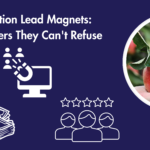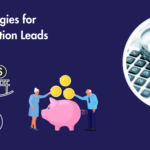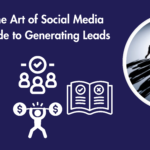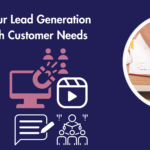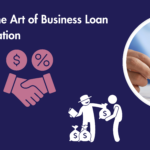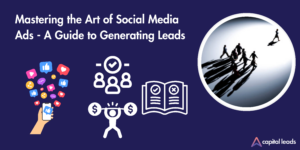In the competitive world of business loans, knowing how to find and connect with potential clients is key. It’s not just about getting noticed. It’s about finding the right businesses that need your loans and helping them understand why you’re the best choice.
Lead generation is crucial in the business loan sector. With so many lenders out there, being able to attract quality leads sets you apart. Good lead generation doesn’t just help you now; it builds lasting relationships that are good for both you and your clients in the long term.
In this guide, we’ll go through various strategies and tips to help you get better at finding and keeping potential clients. We’ll cover everything from digital marketing and networking to understanding your audience and the technology that can help.
Understanding Your Target Audience
To excel in business loan lead generation, the first and foremost step is to understand who you are targeting. Here’s how to get a grip on your target audience:
Identifying Your Ideal Client Profile
Industry Focus
Determine which industries most often seek business loans. Are they startups, established SMEs, or large corporations?
Business Needs
Identify the common reasons these businesses seek loans, such as expansion, equipment purchase, or cash flow management.
Geographic Location
Are your ideal clients local, national, or international? Location can influence their financial needs and access to funding.
Company Size
Understand whether you’re targeting small family-run businesses or larger enterprises, as their loan requirements will differ.
Discussing the Significance of Understanding Client Needs and Financial Behaviours
Tailoring Loan Products
By understanding the specific needs and financial behaviours of your target market, you can tailor your loan products to better fit their requirements.
Effective Communication
Knowing your audience helps in crafting messages that resonate. What language, tone, and channels best reach your audience?
Risk Assessment
Different businesses have different risk profiles. Understanding these can help in assessing loan suitability and risk management.
Building Relationships
Understanding your clients’ needs and behaviours helps in building stronger, more trusting relationships.
Understanding your target audience is not a one-time task but a continuous process. As market dynamics change, so do the needs and behaviours of your clients. Staying informed and adaptable is key to successful business loan lead generation.
Effective Lead Generation Strategies
Mastering lead generation in the business loan sector involves a mix of digital prowess and real-world networking. Here’s how you can effectively harness both worlds:
Digital Marketing Tactics
Digital marketing is a powerful tool in your arsenal. It allows you to reach a broad audience and engage with potential clients where they spend a lot of their time: online.
SEO Best Practices
Start by optimising your website and content for search engines. Use keywords that potential borrowers are likely to search for, such as “small business loans” or “business financing options.” Ensure your website is user-friendly and mobile-responsive, as Google favours sites that provide a good user experience.
Content Marketing
Blogs, eBooks, and Webinars: Create valuable content that addresses the needs and questions of your target audience. Blogs can offer insights on how to secure business loans, eBooks can delve deeper into financial management, and webinars can provide interactive sessions with financial experts. This type of content not only attracts leads but also positions you as a thought leader in the industry.
Social Media Strategies
Use social media platforms to engage with potential clients. LinkedIn can be particularly effective for B2B engagement. Share your blog posts, industry news, and tips on securing business loans. Engaging in discussions and groups related to business financing can also increase your visibility.
Networking and Partnerships
While digital strategies are essential, never underestimate the power of personal connections and partnerships.
Building Relationships with Financial Advisors and Business Consultants
These professionals can be invaluable referral sources. They work with businesses that might need loans and can recommend your services. Regularly engage with these professionals, offering them helpful resources and insights they can share with their clients.
Attending and Participating in Industry Events
Industry events, conferences, and seminars are great for meeting potential clients and partners. Participate actively, whether it’s through speaking engagements, hosting a booth, or simply networking. These events offer opportunities to showcase your expertise and build trust with potential clients.
Leveraging Technology for Lead Generation
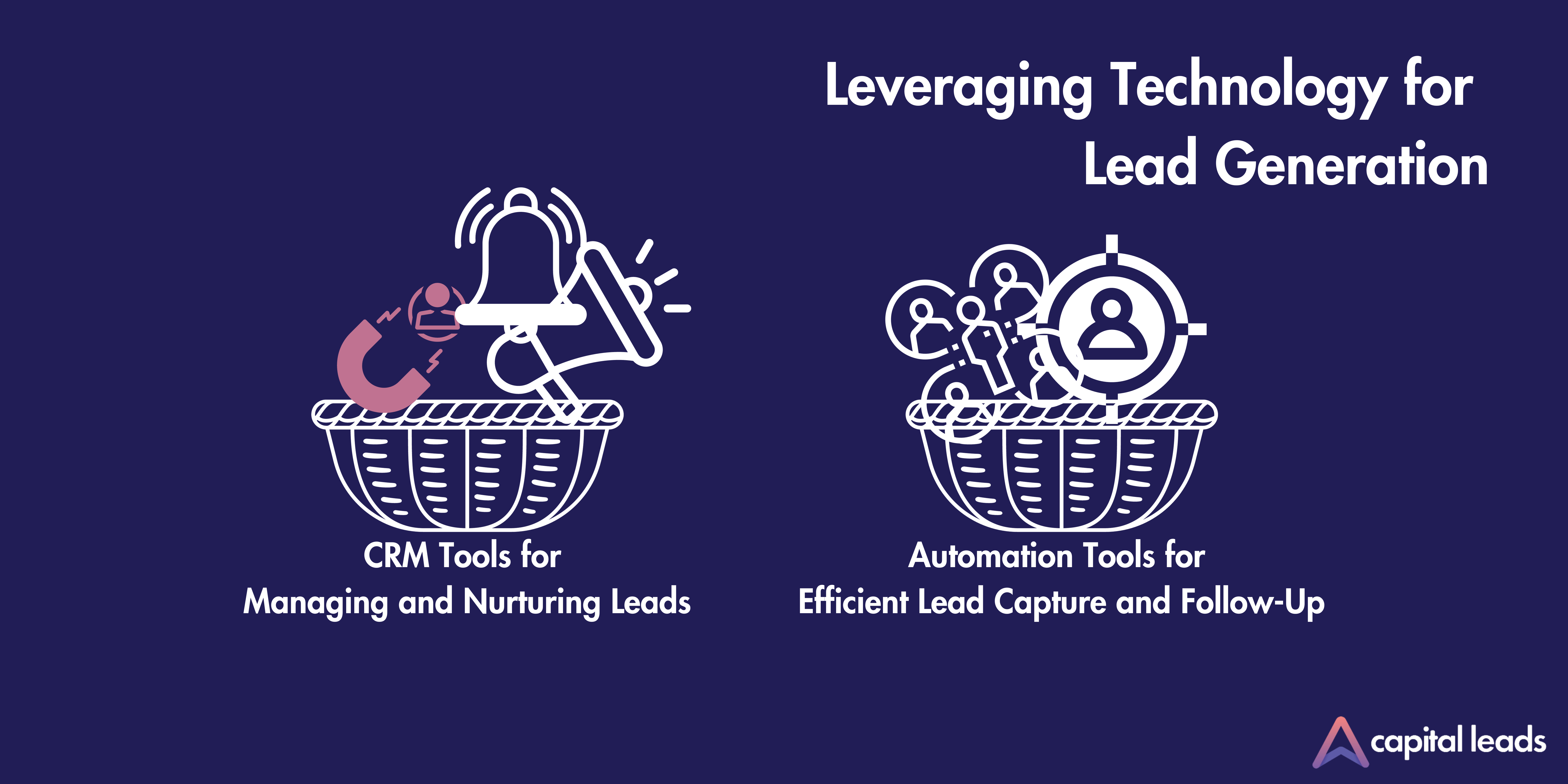
In today’s digital age, technology plays a pivotal role in streamlining and enhancing lead generation efforts. Specifically, Customer Relationship Management (CRM) tools and automation tools are invaluable for managing and nurturing leads effectively.
CRM Tools for Managing and Nurturing Leads
Centralised Lead Information
A CRM system acts as a central repository for all your lead information. It allows you to track every interaction with potential clients, from initial contact to loan closure. This centralised data helps in understanding lead behaviour and preferences, enabling more personalised engagement.
Segmentation and Targeted Communication
Use CRM to segment your leads based on criteria like industry, loan amount needed, and stage in the loan process. This segmentation enables you to tailor your communication strategies, ensuring that you send relevant and timely information to each group.
Lead Scoring and Prioritization
CRM tools often include lead scoring features, which help you prioritise leads based on their likelihood to convert. By focusing your efforts on high-potential leads, you can increase your conversion rates and optimise your sales efforts.
Tracking and Analytics
CRM systems provide valuable insights through tracking and analytics. You can monitor the performance of your lead generation campaigns, understand which strategies are working, and make data-driven decisions to improve your processes.
Automation Tools for Efficient Lead Capture and Follow-Up
Automated Lead Capture
Implement automation tools on your website and social media platforms to capture lead information efficiently. Tools like online forms, chatbots, and landing pages can collect essential details about your visitors, turning them into potential leads without manual intervention.
Automated Email Campaigns
Set up automated email sequences for new leads. These emails can provide more information about your loan products, share customer testimonials, and guide leads through the decision-making process. Automation ensures timely and consistent communication, keeping your brand top-of-mind.
Task Automation and Reminders
Use automation tools to set reminders for follow-up calls or emails. These tools can also automate routine tasks like updating lead statuses or sending out regular newsletters, freeing up more time for your team to engage directly with potential clients.
Integration with Other Tools
Ensure your automation tools integrate seamlessly with your CRM and other marketing tools. This integration provides a cohesive view of your lead generation and nurturing efforts, making it easier to manage and optimise your strategies.
Creating Compelling Offers and Calls-to-Action
In the competitive realm of business loans, creating offers and CTAs that truly resonate with your target market is crucial. These elements can significantly influence a potential client’s decision to engage with your services.
Designing Offers That Resonate with Your Target Market
Understand Your Audience
Start by gaining a deep understanding of your target market’s needs and pain points. Are they small businesses looking for quick funding? Or larger enterprises seeking long-term loans? This understanding will guide your offer design.
Tailored Loan Solutions
Based on your audience analysis, design loan products that meet their specific needs. For example, if you’re targeting small businesses, you might offer a ‘Fast-Track Business Loan’ with simplified application processes and quick disbursement.
Value-Added Services
Differentiate your offers by including value-added services. For instance, along with a business loan, you could provide free financial advisory sessions or access to business planning software.
Time-Bound Offers
Create urgency with time-bound offers. For example, a ‘Limited-Time Interest Rate Discount’ for applications submitted within a certain period can encourage quicker decisions.
Crafting Persuasive Calls-to-Action for Different Stages of the Buyer’s Journey
Awareness Stage
At this stage, your CTA should be about learning more. For example, “Download our Free Guide to Choosing the Right Business Loan” can attract leads who are in the early stages of considering a loan.
Consideration Stage
Here, the CTA should encourage deeper engagement. For example, “Sign Up for a Free Financial Health Checkup” can appeal to businesses actively exploring their loan options.
Decision Stage
CTAs at this stage should be direct and action-oriented. For example, “Apply Now for Your Customised Business Loan” targets leads ready to take the final step.
Example of a Compelling Offer and CTA
Imagine a campaign targeting small businesses in need of rapid funding. The offer could be a “48-Hour Business Loan” – a promise of funds disbursement within two days of application approval. The accompanying CTA could be, “Get Funded Fast: Apply for Your 48-Hour Business Loan Today.”
This offer addresses the specific need for speed and simplicity, while the CTA directly calls for action, appealing to businesses in urgent need of funding.
Lead Qualification and Prioritisation
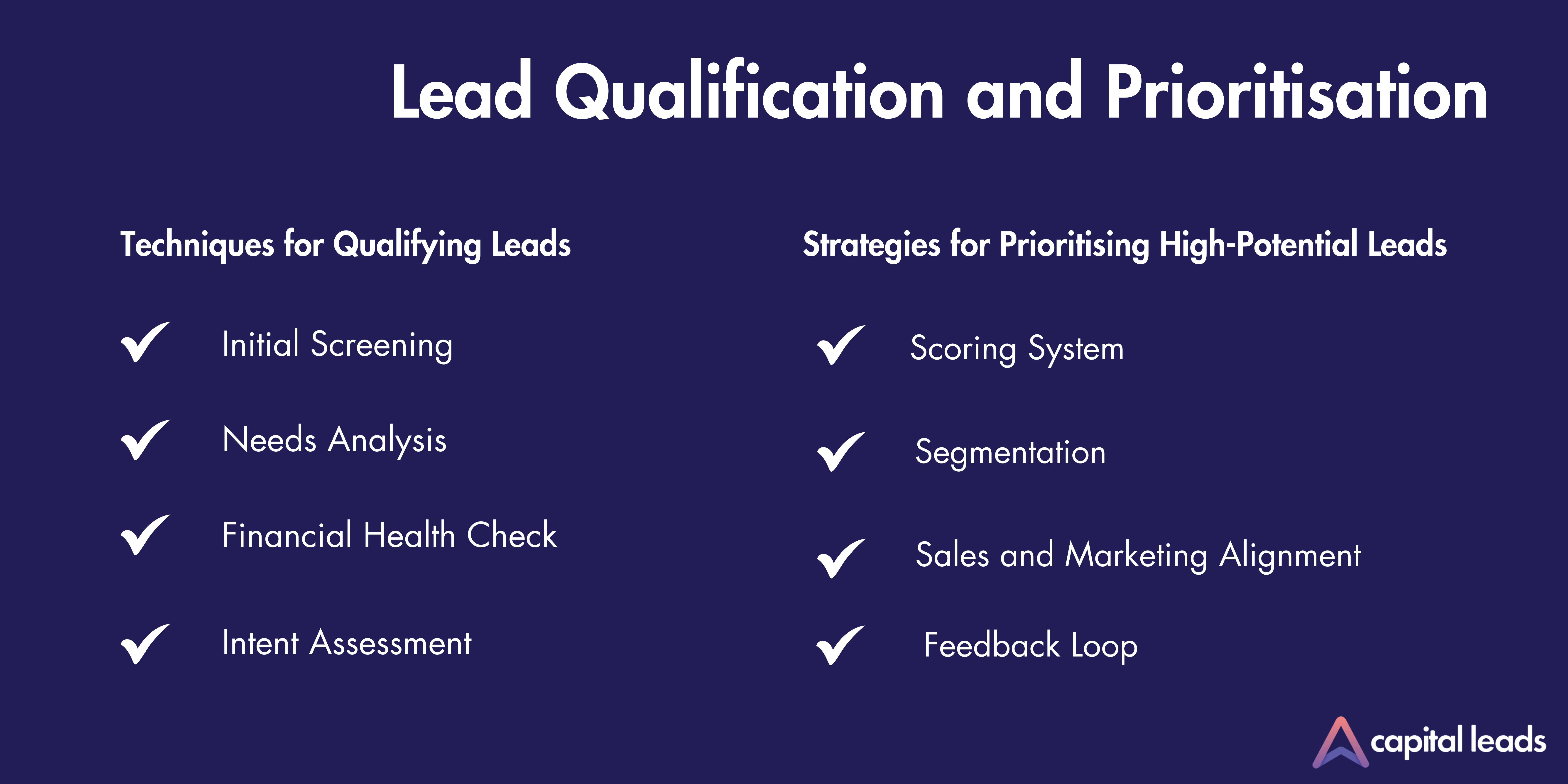
In the realm of business loan lead generation, not all leads are created equal. Qualifying and prioritising leads ensures that your efforts and resources are focused on the prospects most likely to convert into clients.
Techniques for Qualifying Leads
Initial Screening
Start with basic criteria to filter leads. This can include their business size, credit score, and the amount of loan they’re seeking. Use this information to determine if they meet your basic lending criteria.
Needs Analysis
Engage in a deeper conversation to understand their specific needs. What is the purpose of the loan? How does the potential borrower plan to use the funds? This step helps in assessing whether your loan products align with their requirements.
Financial Health Check
Evaluate the financial stability of the business. Look at factors like cash flow, debt-to-income ratio, and historical financial performance. This assessment helps in determining the risk associated with the lead.
Intent Assessment
Gauge their level of interest and urgency. Are they actively seeking a loan, or just exploring options? Understanding their intent can help in prioritising leads who are more likely to close soon.
Strategies for Prioritising High-Potential Leads
Scoring System
Implement a lead scoring system where leads are assigned scores based on factors like business size, financial health, and engagement level. Higher scores indicate leads with a greater likelihood of conversion.
Segmentation
Segment leads into categories such as ‘hot’, ‘warm’, and ‘cold’ based on their likelihood to convert. Focus your efforts on ‘hot’ leads while nurturing ‘warm’ leads and keeping ‘cold’ leads in your long-term follow-up list.
Sales and Marketing Alignment
Ensure that your sales and marketing teams are aligned in their understanding of what constitutes a high-potential lead. Regular meetings and shared criteria for lead qualification can help maintain this alignment.
Feedback Loop
Create a feedback loop where the sales team provides information back to marketing about lead quality. This feedback can be used to refine lead generation and qualification strategies continuously.
Measuring and Analysing Performance
In the business loan sector, the ability to measure and analyse the performance of your lead generation strategies is vital. It helps in understanding what works, what doesn’t, and how to optimise your efforts for better results.
Key Performance Indicators (KPIs) for Lead Generation
Lead Volume
This is the total number of leads generated over a specific period. It’s a basic metric that gives an overview of your lead generation efforts.
Conversion Rate
This measures the percentage of leads that convert into actual loan applications or approvals. It’s crucial for understanding the effectiveness of your lead nurturing process.
Cost Per Lead (CPL)
This KPI calculates the average cost involved in acquiring a lead. It helps in evaluating the efficiency and financial viability of different lead generation channels.
Lead Source Effectiveness
Analyse which channels (social media, email marketing, referrals, etc.) are bringing in the most qualified leads. This helps in allocating resources to the most productive sources.
Time to Conversion
This measures the average time it takes for a lead to move from initial contact to conversion. It’s essential for assessing the efficiency of your sales cycle.
Customer Lifetime Value (CLV)
Particularly important in the loan sector, this metric estimates the total revenue a business can expect from a single client over the course of their relationship.
Tools and Techniques for Tracking and Analysing Results
CRM Software
Your Customer Relationship Management software is not just for managing leads; it’s also a powerful tool for tracking various KPIs related to lead generation and conversions.
Analytics Platforms
Use web analytics tools like Google Analytics to track online engagement and conversion rates. These platforms provide insights into user behaviour on your website and the effectiveness of your digital marketing efforts.
Lead Scoring Tools
Implement lead scoring within your CRM to track how leads progress through your sales funnel. This helps in identifying patterns and trends in lead conversion.
A/B Testing Tools
Use these tools to test different aspects of your lead generation process, such as landing page designs, email campaign messages, and CTA buttons. This testing helps in optimising your strategies based on what resonates best with your audience.
Reporting Dashboards
Create custom dashboards in your CRM or analytics tools to have a real-time view of your KPIs. Regularly review these dashboards to make informed decisions about your lead generation strategies.
Final Thoughts
Lead generation in the business loan sector is an ongoing journey of learning, adapting, and refining.
By embracing a holistic approach, leveraging the right tools, and staying committed to continuous improvement, you can master this art and grow your business effectively.
Remember, each interaction, each lead, and each conversion adds to the story of your success in this exciting and dynamic industry.
At Capital Leads, we are more than just a lead generation company. We are a high-performance team dedicated to generating quality leads at scale for large growth companies.
Our expertise spans across vital sectors like solar, home improvement, and the financial industry. Utilising a multi-platform approach and emphasising quality and data-validation, we understand lead generation from all angles.
Let us help you transform your lead generation process and propel your business forward. Discover how our tailored solutions can make a difference for your company today.
Ready to Take Your Business Loan Lead Generation to the Next Level?



